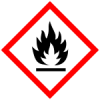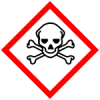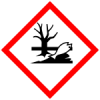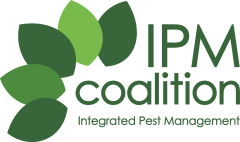The Producer has a plan to phase out by 2021 pesticides listed in category 1 of the Globally Harmonized System of Classification and Labelling of…
Coalition status
BCI Phase out by 2021
FSC restricted HHPs
Chemical pesticide presenting one out of three of the following hazards: acute toxicity, chronic toxicity and environmental toxicity.
GCP ProhibitedPesticides in the Prohibited List are not used.
This includes pesticides that are:
Listed under the Stockholm Convention, Rotterdam Convention or…
UEBT ProhibitedThe use of Prohibited Agrochemicals is prohibited for certified, prioritised and verified ingredients, because they are considered Highly Hazardous…
Details
Type: Pesticide
Use: Fumigant
Example applications:
Example pests controlled:
Mode of action:
Source: PPDB
Toxicty
Fatal if inhaled (H330)
Fatal if inhaled
Mammal toxicity
Acute oral LD50 for most sensitive mammal species (LD50 < 200mg/kg bw).
GHS safety labels
About Globally Harmonized System of Classification and Labelling of Chemicals (GHS)
From Wikipedia: The Globally Harmonized System of Classification and Labelling of Chemicals (GHS) is an internationally agreed-upon standard managed by the United Nations that was set up to replace the assortment of hazardous material classification and labelling schemes previously used around the world. Core elements of the GHS include standardized hazard testing criteria, universal warning pictograms, and harmonized safety data sheets which provide users of dangerous goods with a host of information. The system acts as a complement to the UN Numbered system of regulated hazardous material transport. Implementation is managed through the UN Secretariat. Although adoption has taken time, as of 2017, the system has been enacted to significant extents in most major countries of the world.[1] This includes the European Union, which has implemented the United Nations' GHS into EU law as the CLP Regulation, and United States Occupational Safety and Health Administration standards.
- H224

Extremely flammable liquid and vapour
Class: Flammable
Subclass: Liquids - H300

Fatal if swallowed
Class: Acute Toxicity
Subclass: Oral - H310

Fatal in contact with skin
Class: Acute Toxicity
Subclass: Dermal - H330

Fatal if inhaled
Class: Acute Toxicity
Subclass: Inhalation - H330

Fatal if inhaled
Class: Acute Toxicity
Subclass: Inhalation - H400

Very toxic to aquatic life
Class: Aquatic
Subclass: Acute - H400

Very toxic to aquatic life
Class: Aquatic
Subclass: Acute - H410

Very toxic to aquatic life with long lasting effects
Class: Aquatic
Subclass: Chronic - H410

Very toxic to aquatic life with long lasting effects
Class: Aquatic
Subclass: Chronic
